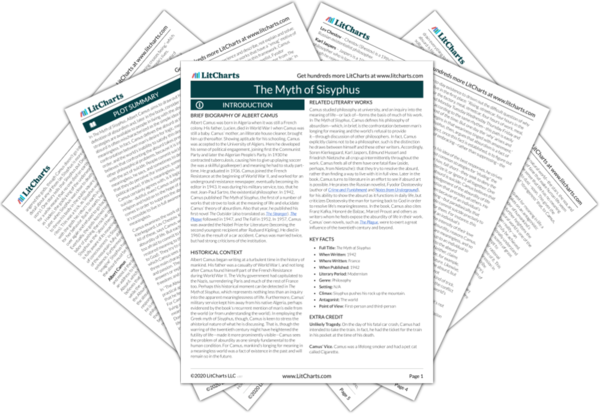Don Juan Quotes in The Myth of Sisyphus
If it were sufficient to love, things would be too easy. The more one loves, the stronger the absurd grows. It is not through lack of love that Don Juan goes from woman to woman. It is ridiculous to represent him as a mystic in quest of total love. But it is indeed because he loves them with the same passion and each time with his whole self that he must repeat his gift and his profound quest. Whence each woman hopes to give him what no one has ever given him. Each time they are utterly wrong and merely manage to make him feel the need of that repetition. “At last,” exclaims one of them, “I have given you love.” Can we be surprised that Don Juan laughs at this? “At last? No,” he says, “but once more.” Why should it be essential to love rarely in order to love much?

Unlock explanations and citation info for this and every other The Myth of Sisyphus quote.
Plus so much more...
Get LitCharts A+Let me repeat that these images do not propose moral codes and involve no judgments: they are sketches. They merely represent a style of life. The lover, the actor, or the adventurer plays the absurd. But equally well, if he wishes, the chaste man, the civil servant, or the president of the Republic. It is enough to know and to mask nothing.

Don Juan Quotes in The Myth of Sisyphus
If it were sufficient to love, things would be too easy. The more one loves, the stronger the absurd grows. It is not through lack of love that Don Juan goes from woman to woman. It is ridiculous to represent him as a mystic in quest of total love. But it is indeed because he loves them with the same passion and each time with his whole self that he must repeat his gift and his profound quest. Whence each woman hopes to give him what no one has ever given him. Each time they are utterly wrong and merely manage to make him feel the need of that repetition. “At last,” exclaims one of them, “I have given you love.” Can we be surprised that Don Juan laughs at this? “At last? No,” he says, “but once more.” Why should it be essential to love rarely in order to love much?

Unlock explanations and citation info for this and every other The Myth of Sisyphus quote.
Plus so much more...
Get LitCharts A+Let me repeat that these images do not propose moral codes and involve no judgments: they are sketches. They merely represent a style of life. The lover, the actor, or the adventurer plays the absurd. But equally well, if he wishes, the chaste man, the civil servant, or the president of the Republic. It is enough to know and to mask nothing.











